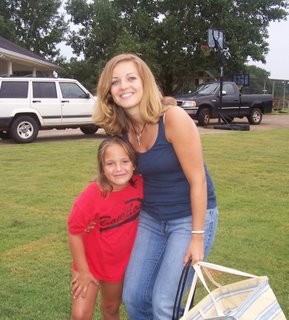Farewell parties/Travel info to Niger
Well I am leaving on Tuesday, and I wanted to thank everyone and tell everyone that I have gotten to see the last few days how much I love yall. To anyone who came a long way to betsy's, you are amazing and I love you. Betsy thank you and everyone who helped with the party, i was a huge surprise and I love you forever. Thanks to EVERYONE for all of the advice, knicknacks, pictures, gifts, thoughts, prayers, well wishes, and farewell parties. And food!! I have probably eaten enough food in the last week to last me two years, which is kinda the idea. As Tommy said, I will probably lose it in the first week anyway. Africa - best diet ever. Anyway, I am overwhelmed with the love that I have gotten the last few days and I love love love you all and it is hard to leave. Of course I am so excited to go, but sad to leave. Its not goodbye, more like seeya later (later being 2 years.) Thanks again to everyone SO MUCH!
Another question that many people have asked is what am I taking. THe answer is way too much!! I have tried to cut down on what I'm taking but it includes: shortwave radio, flashlights, insect repellant tshirts (there IS such a thing), long skirts, a coffee press, journals, digital camera, a flash drive, a small sleeping bag, scrapbooks from my wonderful friends, nalgene bottle, pepper spray/whistle/airhorn (all of which Tanner bought for me "in case I get attacked by anything"), haha, lots of stuff to give away to kids (thanks to miss alex), spices, a thermometer (so i can have bragging rights to say just how hot it was in africa), a headlamp, some candy and tons tons more, but you get the idea. I dont know how I am going to get it all in my suitcase and backpack, but Nikki is coming over tomorrow to help me pack and I've heard she can make miracles happen.
Here are some pics from the farewell parties and such...notice in the last picture that some people are anxious for me to change my mind about going to Africa, hehe.






A lot of people have asked me for information about coming to Niger, and I hope you do!!!!!!! If you do come I'm sure that by the time you get there, I will know tons of things that we can do. There is a huge game park in Niger with all the animals people associate with Africa so we could do a safari (park w, look it up), camels to ride, food to eat, dunes to see, sweat to be sweated, and tons more. I'm just going to cut and copy the information that Peace Corps gave us about the steps that travellers should go through for when they visit volunteers:
Information and Advice for Families and Friends Planning to Visit Niger
The following points of information and advice have been compiled from various sources (previous visitors, former Volunteers, staff, etc.) for people planning to visit Peace Corps Volunteers in Niger. Visitors and Volunteers have learned that advance planning, communication between the Volunteer and visitor, and flexibility are very important aspects of a successful and satisfying trip. We hope that the suggestions and information below will be helpful. You may also wish to consult various travel books such as The Lonely Planet’s Africa on a Shoestring, or West Africa on a Shoestring.
Please note that Trainees are not allowed to have visitors during pre-service training, which takes place during the first few months in Niger. After swearing-in as Volunteers, they should not take leave from their post for vacation for the first three months. Visits from family members and others during this time often have a negative impact on the Volunteer's successful settling-in and integration into their community and their work. Thus, visits should be planned to occur well into the Volunteer's service and not during peak work seasons. We recommend a visit at some point during the second year of service.
1. Planning. Start planning at least six months before departure since several things have to be done sequentially which can add up to several weeks/months. Keep in mind that communication takes a long time, so arranging the logistics through the mail will require a lot of lead time. Make sure that the timing of your visit is convenient for the Volunteer you are visiting. A Volunteer's primary obligation is to her/his job assignment, so be sure that your visit will not disrupt any work plans.
2. Passport. If you do not already have a passport, obtain a passport application and application instructions from a post office or a travel agent. To apply for a passport, you will need the completed application with two passport photos and the application fee.
3. Visa. To apply for a visa to Niger, obtain an application from the Nigerien Embassy, 2204 R Street, NW, Washington, DC 20008; website at http://www.nigerembassyusa.org/embassy.html; their phone number is (202) 483-4224/7, and their fax number is (202) 483-3169. After completing the application, send it to the Embassy with your passport, two passport photos, W.H.O. records showing the required yellow fever vaccination (see below), the application fee, and a copy of either your tickets or your detailed flight itinerary. You will be issued a single entry visa only, unless you specifically request multiple entry. You must have a multiple entry visa if you plan to leave Niger and return during the period of the visa’s validity. Be sure to call the Embassy and verify with them that procedures have not changed since this mailing.
It is our understanding that the Embassy does not have the means to return your passport to you and you must send a pre-paid express mail envelope. If you are in the D.C. area, you can pickup your passport at the Embassy.
Separate visas are required for almost all African countries you may plan to visit, except for intermediate stops where you will not go outside the terminal while en route to or from Niger. Each embassy requires that you send your passport with the visa application, so you can only apply for one visa at a time.
You can consolidate and expedite your passport and visa applications if necessary by going through a private company that handles it for you for an additional fee. (Ask a travel agent for details.)
4. Health. In order to enter Niger, you must get a yellow fever shot and have it logged in a World Health Organization (W.H.O.) medical card. For more information on what additional shots are required or recommended, contact your local health board or the Division of Immunization at the Centers for Disease Control in Atlanta, Georgia, (404) 639-1870, (www.cdc.gov).
You should also plan to take anti-malarial prophylactic drugs (such as mefloquine) during your stay in Niger. Contact the Malaria Hotline at the Centers for Disease Control in Atlanta, Georgia, (404) 639-1610 or (www.cdc.gov) for information on what drug(s) to take and where you can get them.
While in Niger, precautions must be taken with food preparation and water treatment. Drink only water that has been filtered and chlorinated or boiled. Vegetables should also be soaked in a dilute iodine or chlorine solution if they are not being cooked. Your Volunteer family member will receive extensive training on how to prepare food and treat water and will be able to advise you once you arrive in country.
You should be aware that there are some health risks related to traveling in Niger, and medical facilities there are not comparable to facilities in the U.S. By law, Peace Corps medical staff cannot care for family members or friends who require medical attention while in Niger. We strongly suggest that you consider extra insurance with emergency evacuation coverage from a company such as International SOS Assistance, Inc. (P.O. Box 11568, Philadelphia, PA 19116, 1-800-523-8930 or 215-244-1500 in PA).
5. Money. The unit of currency in Niger is the CFA (1 USD=~519 CFA). Travelers’ checks are recommended. You may want to take at least some travelers checks in Euros, since switching US dollars to CFA in Niamey can be more expensive than switching dollars to Euros in the U.S. and then Euros to CFA in Niamey. Some of the big (and expensive) hotels in Niamey will accept credit cards. Note: There is no American Express office in Niger. The best person to answer questions about money (and how much to take) is the Volunteer whom you are planning to visit or the Administrative Officer at post (best reached by email: AO@ne.peacecorps.gov). Individual circumstances differ and practices change, therefore post can provide better information on a case-by-case basis.
6. Baggage. Have all your suitcases locked. On most airlines, you are allowed 80 pounds of baggage per passenger for trips from the United States to Europe, but only 20 kg (44 lbs) for intra-European or African flights. Therefore, you may be charged an excess baggage fee for anything over 44 lbs from Europe to Africa unless you check your baggage through to Africa directly from the U.S. (If you check baggage all the way through, be sure the baggage ticket has all appropriate code letters for the trip; the code for the airport in Niamey is NIM, and the Charles de Gaulle airport in Paris is CDG.) Consult your airline/travel agent for further info.
7. Flight Check-In. If you fly through Paris, arrive at the check-in counter for the flight to Niamey at least two hours before scheduled departure. Airlines start checking passengers in then and you may not be able to get a seat assignment until this time. The check-in process goes very slowly, so be prepared to stand in line for a long time. Most airlines will not allow large carry-on bags.
8. Arrival in Niamey. You must have both your passport and W.H.O. card for immigration when arriving at the Niamey airport. Only French and local languages are spoken at the airport, so ask the Volunteer you are visiting to try to have someone meet you at the airport. You may have to open all bags for inspection. Each bag will be marked with an “X” in chalk to show it has been inspected. Be sure that they mark it plainly since this “X” will be verified again at the exit. Try to keep all your bags in sight once they come into the baggage area. There will be men pressing to carry your bags for payment. Carry your bags yourself if you can. If not, negotiate a price with one person before allowing anyone to take your bags. If no one is going to meet you at the airport, get instructions ahead of time from the Volunteer on how to take a taxi to your next destination. Above all, try to be prepared for a very hectic airport scene.
9. Accommodations. Your best source of information about where to stay is the Volunteer whom you are planning to visit. The Hotel Sofitel Gaweye is recommended by Peace Corps staff in country.
10. Photos. Picture taking is highly restricted in Niamey and you should ask permission before taking any photos. Photos are never allowed at the airport or any military installation. The same policy applies to camcorders.
11. Identification and Registration. During the course of your stay in Niger, you may have to show your passport to the police several times, therefore you should carry it with you in a safe place at all times. If you stay in any village, you must register with the local police where they will check your passport and stamp it with the local seal just like most countries do when you enter or exit the country. This should not be a big inconvenience; it just takes time and patience.
Hope that helped if you are trying to come to Niger. I will put pictures up from in country as soon as technology allows. I miss you all already. Thank you for reading and caring!!!!!
Love lots, Katie

1 Comments:
I miss you already Katie and sorry I couldn't make it to see you. I love you soooooooo much and hopefully I can come visit this year. I should hear back from Australia soon so say a prayer for me! You are one of the most beautiful people that I know. I'll keep you in my prayers and I will go ahead and send you a letter. His Peace and His Love,
Myia
Post a Comment
<< Home